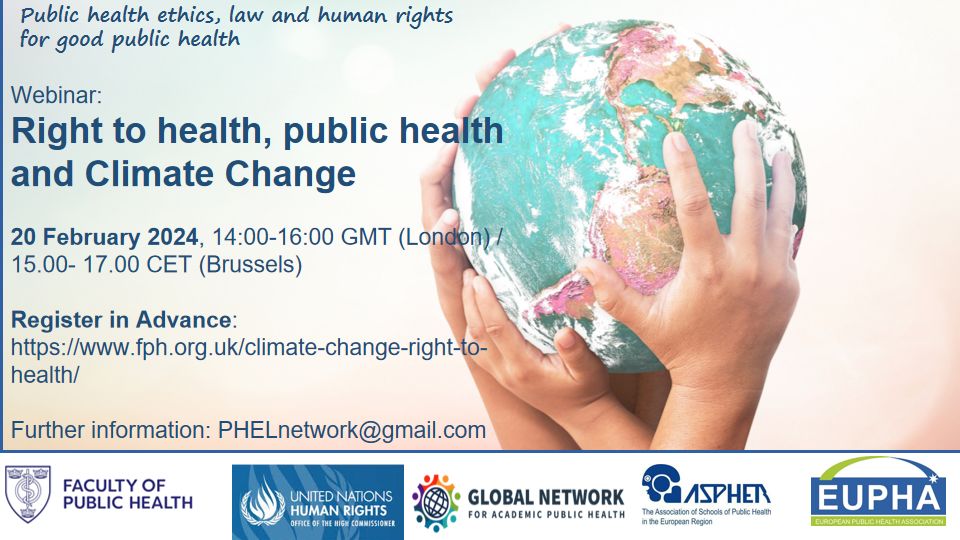 |
The European Public Health Association Newsletter - January 2024 |
1. EditorialDear EUPHA Community,
It's with a mix of gratitude and fondness that we share the news of Maaike, our Deputy Director, bidding farewell after seven remarkable years at EUPHA. In her own words, "After seven inspiring years at EUPHA, the time has come for me to say goodbye. The memories of our collaborations, including EU projects, publications, and science-based advocacy, will stay with me as I embark on new endeavors." 2024 is pivotal, with elections in the EU Parliament and across various countries. We recognize it as a unique opportunity to advocate for the prioritization of health on political agendas.At EUPHA, we are committed in carrying forward our dedication to advocating for evidence-based policies across all our thematic areas. As we navigate the landscape of 2024, our work is also to be seen through the lens provided by the EPH conference's theme: Innovation. How to ensure that Public Health principles, starting with equity and community participation, are seamlessly integrated into innovation’s frameworks? Let’s also remember that innovation extends beyond digitalization; it encompasses novel methods. Health in All Policies remains a cornerstone of our strategy. Therefore, our advocacy aims not only to engage with the health community but also to reach all stakeholders influencing health determinants. Let's employ innovative methods to make our message more transversal, resonating with a broader audience. Warm regards, Dr Iveta Nagyova, EUPHA President, and Charlotte Marchandise, Executive Director |
2. EUPHA updateEUPHA/EPH Conference Chief Finance and Administration OfficerEUPHA and EPH Conference are seeking a qualified and dynamic Chief Finance and Administration Officer part-time (m/f/o) to join our team in Utrecht.
Health must stay high on the political agenda!The EU4Health Civil Society Alliance gethering more than 30 health civil society organisations, including EUPHA, has defined its priorities and recommendations ahead of the upcoming European elections in 2024, with the overarching goal of securing health on the EU political agenda. The manifesto gathers 10 key priorities, focusing on strengthening EU policymaking in public health, delivering stronger policies improving public health, and breaking policy silos. Upcoming EUPHA webinars
Right to health, public health and climate change Register in advance here. A national and sub-national analysis of diabetes mellitus prevalence and health inequalities in Europe
Register in advance here. More information about EUPHA webinars are available here. |

3. European Public Health WeekAlmost two billion people in 50 countries around the world will head to the polls this year (or already have), more than in any other year in history. This includes the 2024 European Parliament (EP) election, scheduled to be held from 6 to 9 June 2024, when 400 million Europeans will be able to cast their vote. Next to the EP elections, 15 European countries will hold presidential and parliamentary elections in 2024. In line with this, the 2024 European Public Health Week (EUPHW), which will take place from 13 -17 May, will focus on an important notion that public health is a political choice. Traditionally, for the EUPHW, a lot of emphasis will also be put on topics of mental health, climate change, lifelong health and public health leaders of tomorrow... Save the dates (13 - 17 May 2024) and stay tuned for detailed information on the 2024 European Public Health Week during February! #EUPHW2024 |
4. European Public Health Conference17th EPH CONFERENCE LISBON 2024 - SAILING THE WAVES OF EUROPEAN PUBLIC HEALTH: EXPLORING A SEA OF INNOVATIONNext webinar 'Sailing to Lisbon 2024': 16 February 2024, 11:00 CETJoin us for our monthly webinar series titled ‘Sailing to Lisbon 2024’ on 16 February, 11:00 CET. Theme of the second webinar: Health Inequalities. Moderator: João Paulo Magalhães (Portugal). Speakers will be announced shortly. Click here for the programme and access to the webinar. Abstract submission opens 1 FebruaryAbstract submission for the 17th EPH Conference 2024 is open from 1 February noon CET until 1 May 2024, 18:00 CET. Abstracts are invited for workshops, oral presentations, pitch presentations and ePosters. All sessions will be 60 minutes. Do not miss the opportunity to be recognized for your hard work. Learn from each other and share your knowledge with others. More information here. Abstract tutoring programmeEPH Conference and EUPHAnxt offer an Abstract Tutoring Programme providing an opportunity for young and/or less experienced abstract submitters to receive feedback from experienced reviewers. The programme is targeted at researchers who have limited access to colleagues to ask for guidance and comments on their proposed abstracts. More information here. RegistrationRegistration for the 17th EPH Conference opens 1 April 2024. Registration fees will be announced on our website. Theme and programmeThe 17th EPH Conference will be held in Lisbon, Portugal, from 12 – 15 November 2024. Note that from 2024 onwards main EPH Conferences will be held from Wednesday to Friday. Pre-conferences will be held on Tuesday 12 November. The main conference is from 13 – 15 November. Theme of the EPH conference 2024 is: Sailing the waves of European public health: exploring a sea of innovation. The conference will be held at the Lisbon Congress Center (CCL). Read more here.
|

5. European Journal of Public HealthAdvance articlesIs the long-term poor prognosis of acute myocardial infarction in patients with mental illness mediated through their poor adherence with recommended healthcare? |
6. Call for proposals, job opportunitiesDirector Master of Public Health Program Western University London, Ontario CanadaWestern University invites applications for the position of Director, Schulich Interfaculty Program in Public Health (https://www.schulich.uwo.ca/publichealth/). This Program at Western is unique amongst North American Public Health Programs in providing an innovative case-based curriculum with a focus on teamwork, leadership, sustainability, and policy both in the Canadian context and globally. The current intensive one-year Masters in Public Health curriculum prepares tomorrow’s public health leaders through classroom experience, practicums and community-engaged learning facilitated by strong connections to local, national, and global public health organizations including the Middlesex-London Health Unit, Public Health Ontario, the Public Health Agency of Canada, the Pan-American Health Organization, and the World Health Organization. |
7. Interesting newsHow can EU scale-up action on non-communicable disease prevention?This EuroHealth article proposes:
Only half of the countries in Europe have policies to improve digital health literacy, leaving room for false medical information to spread. WHO/Europe’s David Novillo explains how health literacy can help counter disinformation in this USA Today article. |
8. Upcoming courses and conferences
|
9. Interesting publicationsAmbient greenness, access to local green spaces, and subsequent mental health: a 10-year longitudinal dynamic panel study of 2·3 million adults in WalesThe Lancet Planetary Health | October 2023 The path to a European Health UnionThe Lancet Regional Health – Europe | January 2024 Identifying disease-specific patient and societal needs to foster needs-driven healthcare and innovation policies in the EUEuroHealth | 16 January 2024 |
10. European Institutions’ newsAbout RespiCast: the new European Respiratory Diseases Forecasting HubLaunched at the end of 2023, the European Respiratory Diseases Forecasting Hub (RespiCast) serves as a platform for real-time forecasts of respiratory disease activity and burden. Its aim is to provide decision-makers, public health bodies and the public with reliable and timely information on the short-term epide-miological trajectory of respiratory illnesses across Europe. Visit respicast.ecdc.europa.eu for more information and to participate in this initiative. Human medicines: EMA highlights of 2023EMA published its overview report 'Human medicines highlights 2023' that includes figures on the authorisation of medicines and a selection of new treatments that represent significant progress in their therapeutic areas. Meeting EU environment policy targets by 2030 will be challengingThe EU 8th Environment Action Programme (EAP) builds on the European Green Deal and sets the framework for EU environmental policy until 2030. European Environment Agency's first monitoring report on the progress towards the 8th EAP objectives takes stock of progress towards Europe’s key environment and climate goals, based on 28 indicators and monitoring targets. The report shows that the EU may not meet most of the monitoring targets: stronger implementation by the Member States of existing laws, additional measures, and mainstreaming climate and environment in other policy domains are needed for faster progress. It is the first of the series to be published annually until 2030. More details can be found in the recently published Monitoring report on progress towards the 8th EAP objectives 2023 edition. Past events of the European Observatory on Health Systems and Policies.Future-proof health systems: Fostering transformation, performance & resilience, 24 Jan Public debate on the future health priorities of the European Union #1 Building on value-based health care: Towards a health system perspective, 30 Jan Placing people at the centre: Patients, citizens & health workers, 31 Jan Public debate on the future health priorities of the European Union #2 |
11. European Centre for Disease Prevention and Control newsEurosurveillance - Volume 29, Issue 4, 25 January 2024Rapid communication Surveillance Letter Eurosurveillance - Volume 29, Issue 3, 18 January 2024Rapid communication Outbreaks Research Eurosurveillance - Volume 29, Issue 2, 11 January 2024Editorial Rapid communication Research Eurosurveillance - Volume 29, Issue 1, 04 January 2024Rapid communication Outbreaks Research |
12. WHO newsWHO global report on trends in prevalence of tobacco use 2000-2030A decrease in prevelance is reported, but the progress is too slow compared to the WHO Framework Convention on Tobacco Control – target 3.a under the Sustainable Development Goals agenda. Moreover, the European Region is projected for highest rates globally by 2030 with 23% of tobacco users. Learn more in the WHO Global Tobacco Trends Report 2024. Health and care workforce in Europe: time to actAll countries of the WHO European Region currently face severe challenges related to the health and careworkforce (HCWF). This report focuses on identifying effective policy and planning responses to these HCWF challenges across the Region. The report presents an overview of the HCWF situation in the Region (focusing onmedical doctors, nurses, midwives, dentists, pharmacists and physiotherapists, for whom data are available) and identifies relevant policy options, their expected benefits and potential facilitators or barriers to successful implementation. COVID-19 vaccinations have saved more than 1.4 million lives in the WHO European Region, a new study findsSince their introduction in December 2020, COVID-19 vaccines have reduced deaths due to the pandemic by at least 57%, saving more than 1.4 million lives in the WHO European Region. Most of those saved were aged 60 or older, the group at highest risk of severe illness and death from the SARS-CoV-2 virus. The first vaccine booster alone saved 700 000 lives. |
|
|
|
Unsubscribe If you would like unsubscribe from the EUPHA newsletter then please click here. |



